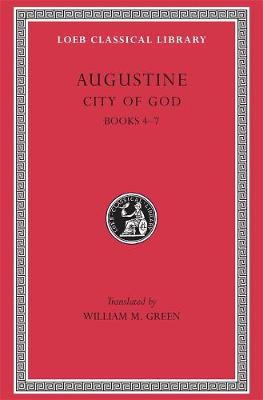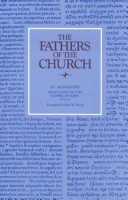Fathers of the Church
17 primary works • 19 total works
Book 2
Christian Instruction, Admonition and Grace, Christian Combat, Faith, Hope and Charity
by Edmund Augustine
Book 4
Book 5
The Happy Life, Answer to Skeptics, Divine Providence and the Problem of Evil, Soliloquies
by Edmund Augustine
Book 11
Commentary on the Lord's Sermon on the Mount with Seventeen Related Sermons
by Edmund Augustine
Book 14
Augustinus (354 430 CE), son of a pagan, Patricius of Tagaste in North Africa, and his Christian wife Monica, while studying in Africa to become a rhetorician, plunged into a turmoil of philosophical and psychological doubts in search of truth, joining for a time the Manichaean society. He became a teacher of grammar at Tagaste, and lived much under the influence of his mother and his friend Alypius. About 383 he went to Rome and soon after to Milan as a teacher of rhetoric, being now attracted by the philosophy of the Sceptics and of the Neo-Platonists. His studies of Paul's letters with Alypius and the preaching of Bishop Ambrose led in 386 to his rejection of all sensual habits and to his famous conversion from mixed beliefs to Christianity. He returned to Tagaste and there founded a religious community. In 395 or 396 he became Bishop of Hippo, and was henceforth engrossed with duties, writing and controversy. He died at Hippo during the successful siege by the Vandals.
From Augustine's large output the Loeb Classical Library offers that great autobiography the Confessions (in two volumes); On the City of God (seven volumes), which unfolds God's action in the progress of the world's history, and propounds the superiority of Christian beliefs over pagan in adversity; and a selection of Letters which are important for the study of ecclesiastical history and Augustine's relations with other theologians.
Book 16
Book 27
Book 35
Book 38
Book 56
Book 60
Book 70
Book 78
These chapters contain some of the best-known episodes from the life of Christ: the encounter with the woman caught in adultery; the healing of the man born blind; the raising of Lazarus from the dead; Mary's anointing of Christ's feet; and Christ's triumphant entrance into Jerusalem. The passages also contain some of Christ's most explicit teaching of his divinity. In unfolding the mysteries contained in these chapters of St John, Augustine moves easily from exegesis to reflections on moral virtue and doctrine, especially the Trinity and the Incarnation. But he never loses sight of his audience. Even in his comments on the loftiest of ideas, he strives to make his teaching accessible to everyone. Augustine's preaching shows us not only his brilliant mind and rhetorical skill as he expounds upon the scriptures, but also the great love he had for Christ and for the faithful entrusted to his care.
Book 79
Book 81
Book 84
Book 92
Tractates on the Gospel of John, 112-124, Tractates on the First Epistle of John
by Edmund Augustine and Augustine of Hippo
v. 86
Four Anti-Pelagian Writings
by Edmund Augustine and St Augustine of Hippo


